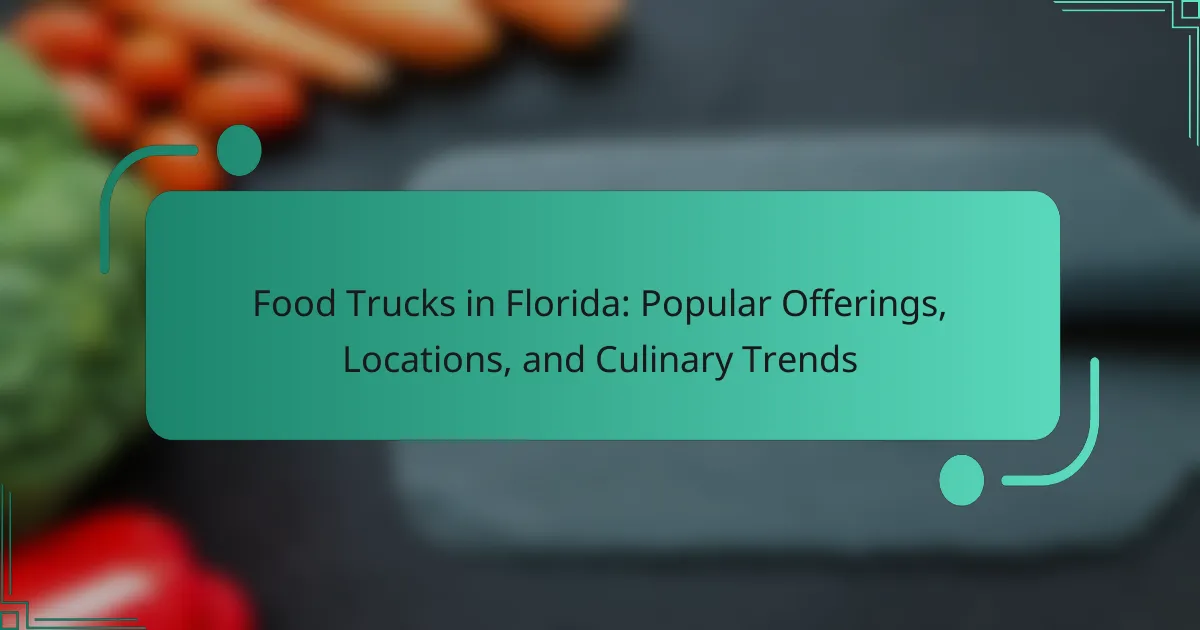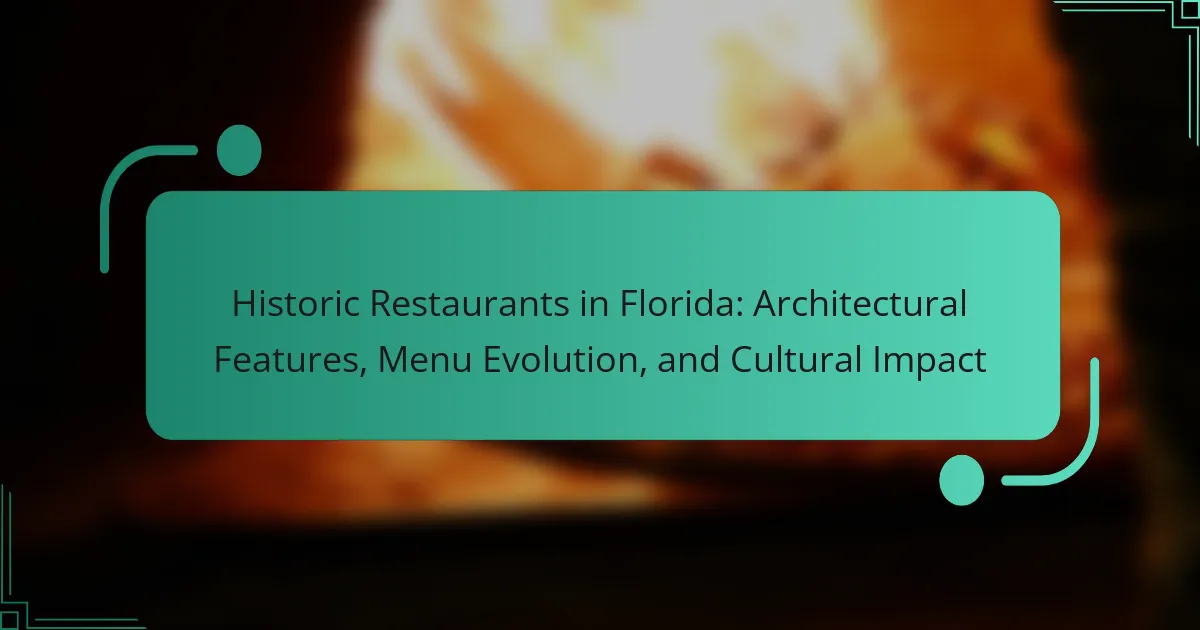Food trucks in Florida are mobile kitchens that provide a wide range of food options, serving diverse cuisines from traditional American to international dishes. These food trucks operate in various locations, including urban areas, festivals, and markets, with popular cities like Miami, Orlando, and Tampa hosting regular gatherings. The food truck industry in Florida is experiencing significant growth, driven by consumer preferences for quick, accessible meals and emerging culinary trends such as fusion cuisine, health-conscious options, and sustainability practices. This overview highlights the vibrant food truck scene, emphasizing its unique dining experiences and the regulations that ensure food safety and compliance.
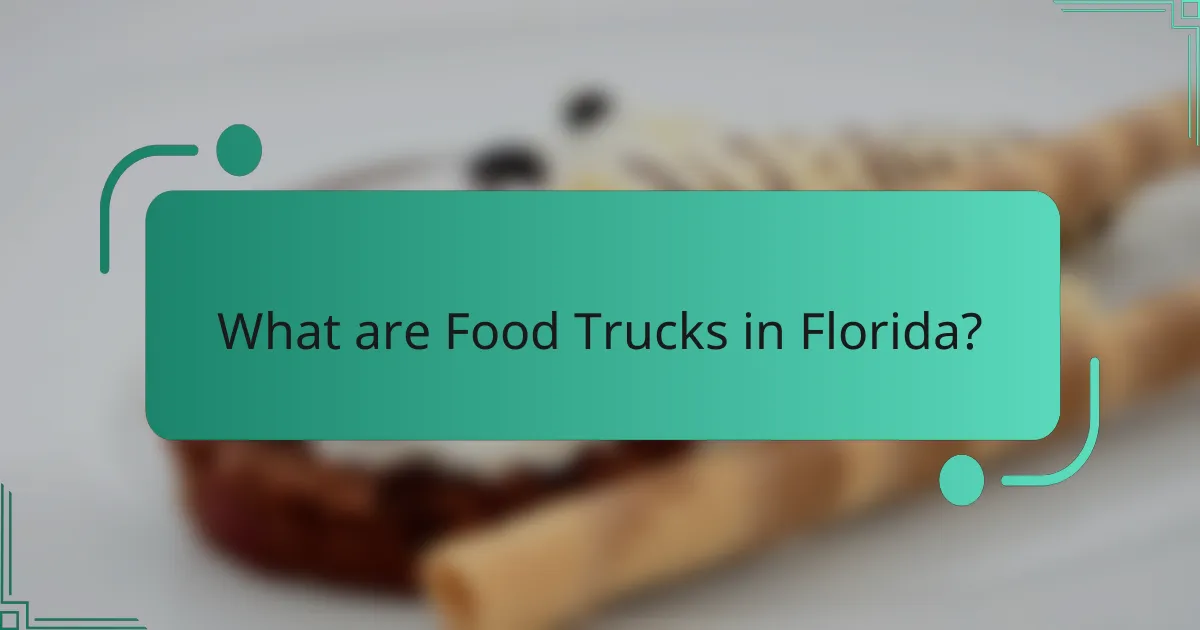
What are Food Trucks in Florida?
Food trucks in Florida are mobile kitchens that offer a variety of food options to customers. They operate from trucks or trailers and serve meals at various locations. Florida’s food truck scene features diverse cuisines, from traditional American fare to international dishes. Many food trucks participate in local events, festivals, and markets. They provide a unique dining experience, often with a casual and vibrant atmosphere. The state has regulations governing food truck operations, ensuring food safety and compliance. Popular cities for food trucks include Miami, Orlando, and Tampa. The food truck industry in Florida has grown significantly, reflecting changing consumer preferences for quick and accessible meals.
How do Food Trucks differ from traditional restaurants?
Food trucks differ from traditional restaurants primarily in their mobility and operational structure. Food trucks operate from a mobile kitchen, allowing them to serve food at various locations. Traditional restaurants are fixed establishments with a permanent address.
Food trucks often have lower startup and operational costs compared to traditional restaurants. This makes them accessible for new entrepreneurs. Traditional restaurants typically require significant investment in real estate and infrastructure.
Menu offerings in food trucks are often limited but can change frequently, catering to trends and local tastes. Traditional restaurants usually have a broader, more stable menu.
Additionally, food trucks can capitalize on events and festivals, providing flexibility in customer reach. Traditional restaurants rely on a consistent customer base from their location.
What unique features define Food Trucks in Florida?
Food trucks in Florida are defined by their diverse culinary offerings and vibrant culture. They often feature a fusion of international cuisines, reflecting Florida’s multicultural population. Many food trucks focus on fresh, locally sourced ingredients to enhance flavor and sustainability. The warm climate allows for year-round operations, making them popular at festivals and outdoor events. Florida’s food trucks frequently engage in social media marketing to attract customers and announce their locations. They also often participate in food truck rallies, creating a communal dining experience. Unique to Florida, some trucks specialize in seafood dishes, leveraging the state’s coastal resources. Additionally, many food trucks offer vegan and vegetarian options to cater to health-conscious consumers.
How has the concept of Food Trucks evolved over time?
The concept of food trucks has evolved significantly since their inception. Initially, food trucks were simple mobile vendors selling snacks and hot meals. They gained popularity in the United States during the 1970s and 1980s, primarily in urban areas. In the 2000s, the gourmet food truck movement emerged, offering high-quality, diverse cuisine. This shift attracted a new customer base seeking unique dining experiences. Social media played a crucial role in promoting food trucks, allowing them to connect with customers and build a loyal following. Today, food trucks operate in various settings, including festivals, events, and designated food truck parks. They now serve a wide range of culinary styles, reflecting local and global food trends. The evolution of food trucks showcases their adaptability and growing presence in the food industry.
What types of cuisine are commonly offered by Food Trucks in Florida?
Food trucks in Florida commonly offer a diverse range of cuisines. Popular options include Mexican, such as tacos and burritos. American cuisine features burgers and barbecue. Asian influences include Thai and Vietnamese dishes. Seafood is also prevalent, reflecting Florida’s coastal culture. Additionally, vegetarian and vegan options are increasingly available. Many food trucks incorporate local ingredients to enhance flavors. This variety caters to a wide array of tastes and dietary preferences.
Which regional specialties are popular among Florida Food Trucks?
Popular regional specialties among Florida food trucks include Cuban sandwiches, fish tacos, and key lime pie. Cuban sandwiches feature layers of roasted pork, ham, Swiss cheese, pickles, and mustard on Cuban bread. Fish tacos often use fresh, local fish, topped with cabbage slaw and zesty sauces. Key lime pie, a classic Florida dessert, is made from key lime juice, sweetened condensed milk, and a graham cracker crust. These specialties reflect Florida’s diverse culinary influences and coastal resources. Food trucks across the state frequently showcase these dishes, appealing to both locals and tourists.
How do Food Trucks cater to diverse dietary preferences?
Food trucks cater to diverse dietary preferences by offering a variety of menu options. They frequently include vegetarian, vegan, gluten-free, and allergen-friendly dishes. Many food trucks adapt their recipes to accommodate specific dietary needs. For instance, some use plant-based proteins to appeal to vegans. Others provide gluten-free alternatives for those with celiac disease. Seasonal ingredients are often utilized to enhance freshness and cater to local tastes. Food trucks also engage with customers to understand their preferences better. This responsiveness helps them adjust offerings based on demand. Overall, the flexibility of food trucks allows for a broad range of dietary accommodations.
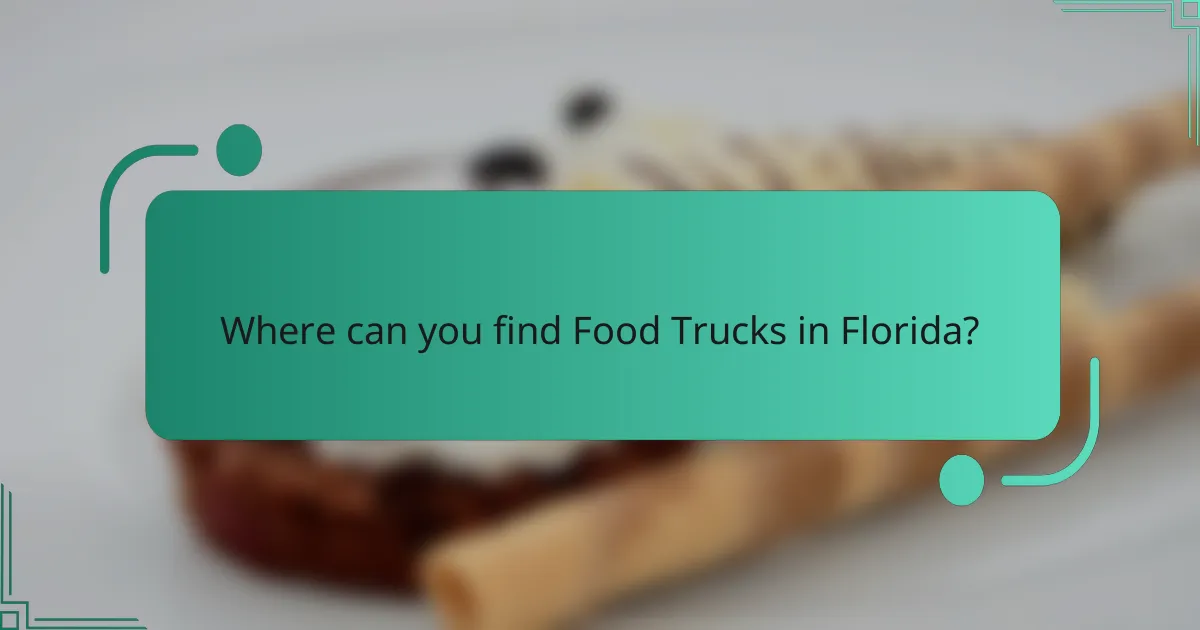
Where can you find Food Trucks in Florida?
Food trucks in Florida can be found in various locations, including urban areas, festivals, and events. Major cities like Miami, Orlando, and Tampa host food truck gatherings regularly. Popular areas include food truck parks and markets where multiple vendors gather. Events such as food festivals and local fairs often feature food trucks. Additionally, many food trucks utilize social media to announce their locations. This allows customers to track them in real-time. Food truck directories and apps can also provide updated information on their locations. These resources help food enthusiasts discover new and popular food trucks throughout Florida.
What are the most popular locations for Food Trucks in Florida?
The most popular locations for food trucks in Florida include Miami, Orlando, and Tampa. Miami is known for its vibrant food truck scene, particularly in areas like Wynwood and South Beach. Orlando hosts food trucks at events like the Food Truck Bazaar and in neighborhoods such as East End Market. Tampa features food truck rallies at places like the Tampa Riverwalk and Armature Works. These cities attract food truck enthusiasts with diverse culinary offerings and frequent events.
Which cities in Florida have the highest concentration of Food Trucks?
Miami, Orlando, and Tampa have the highest concentration of food trucks in Florida. Miami boasts a vibrant food truck scene, particularly in neighborhoods like Wynwood and Downtown. Orlando’s food trucks are popular at events and festivals, with a strong presence in areas like Lake Eola. Tampa features a diverse food truck community, especially around Ybor City and downtown. These cities host regular food truck gatherings and events, enhancing their culinary landscapes.
How do events and festivals influence Food Truck locations?
Events and festivals significantly impact food truck locations. Food trucks often position themselves near large gatherings to maximize customer access. These events draw crowds, increasing foot traffic and potential sales. For example, during the Florida State Fair, food trucks benefit from high attendance. Studies show that food trucks near events see a sales increase of 30% or more. Additionally, festivals often provide designated areas for food vendors. This arrangement ensures food trucks are strategically placed for visibility and convenience. Thus, events and festivals create lucrative opportunities for food truck operators.
What regulations affect Food Truck operations in Florida?
Food truck operations in Florida are regulated by various state and local laws. Each county and city may have its own specific regulations. Common requirements include obtaining a business license, health permits, and food service permits. Food trucks must comply with food safety regulations set by the Florida Department of Health. Additionally, they often need to adhere to zoning laws that dictate where they can operate. Some areas require food trucks to have designated parking spots or permits for street vending. Compliance with fire safety standards is also mandatory. These regulations ensure public health and safety while allowing food trucks to operate legally.
What permits are required for Food Trucks to operate legally?
Food trucks must obtain several permits to operate legally. These typically include a food service license issued by the local health department. A business license is also required to operate within the jurisdiction. Additionally, food trucks may need a mobile food vendor permit specific to their city or county. Compliance with zoning regulations is essential, as certain areas may restrict food truck operations. Fire permits may be necessary if cooking equipment is used on board. Insurance coverage is often required to protect against liabilities. Each locality may have unique requirements, so checking with local authorities is crucial.
How do health and safety regulations impact Food Truck businesses?
Health and safety regulations significantly impact food truck businesses. These regulations ensure that food is prepared and served in a safe environment. Compliance with these rules is mandatory for operation. Violations can lead to fines or shutdowns. Food trucks must obtain permits and pass inspections. Regulations cover food handling, sanitation, and employee health. For instance, the Florida Department of Business and Professional Regulation sets specific guidelines. Adhering to these standards builds customer trust and enhances business reputation.
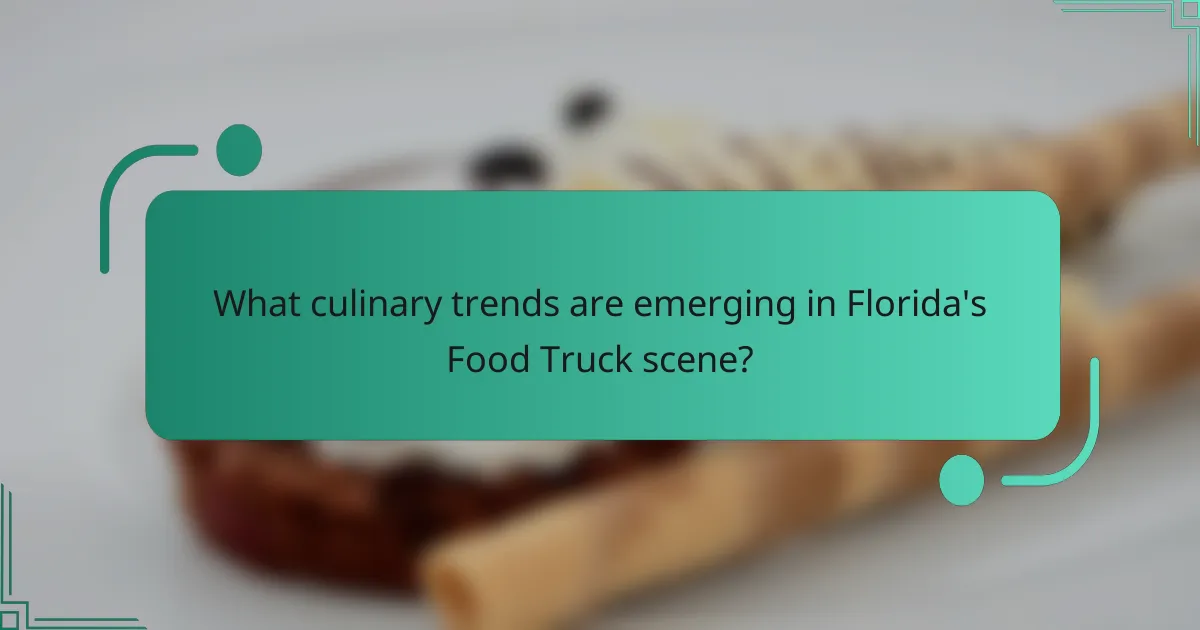
What culinary trends are emerging in Florida’s Food Truck scene?
Florida’s food truck scene is experiencing several emerging culinary trends. One prominent trend is the fusion of international cuisines. Food trucks are blending flavors from Latin American, Asian, and Caribbean cultures. This results in unique dishes that attract diverse clientele. Another trend is the emphasis on health-conscious options. Many food trucks are now offering vegan, gluten-free, and organic choices. This shift caters to the growing demand for healthier eating. Additionally, sustainability is becoming a key focus. Food trucks are increasingly using locally sourced ingredients and eco-friendly packaging. This aligns with consumer preferences for environmentally responsible dining. Lastly, gourmet street food is on the rise. Trucks are elevating traditional comfort foods with high-quality ingredients and innovative presentations. These trends reflect the dynamic culinary landscape of Florida’s food truck industry.
How are Food Trucks adapting to changing consumer preferences?
Food trucks are adapting to changing consumer preferences by offering diverse and healthier menu options. Many food trucks now incorporate plant-based dishes and organic ingredients. This shift aligns with the increasing demand for healthier eating habits. Additionally, food trucks are utilizing technology for online ordering and contactless payment. This caters to consumers seeking convenience and safety, especially post-pandemic. Many trucks are also focusing on local sourcing of ingredients to appeal to environmentally conscious customers. This trend supports local economies and reduces carbon footprints. Furthermore, food trucks are embracing social media marketing to engage with customers effectively. This strategy helps them stay relevant and responsive to consumer feedback.
What innovative dishes are being introduced by Florida Food Trucks?
Florida food trucks are introducing innovative dishes that reflect diverse culinary influences. Examples include gourmet tacos with fusion ingredients like kimchi and pulled pork. Another trend features plant-based burgers that appeal to vegan customers. Food trucks are also offering unique dessert options, such as gourmet doughnuts filled with tropical fruits. Additionally, some trucks serve seafood specialties, like shrimp po’boys with spicy remoulade. These dishes showcase local ingredients and cultural flavors. Florida’s food truck scene is continually evolving, attracting food enthusiasts with creative offerings.
How are sustainability practices being integrated into Food Truck operations?
Sustainability practices are increasingly integrated into food truck operations through various methods. Many food trucks use locally sourced ingredients to reduce carbon footprints. This practice supports local farmers and minimizes transportation emissions. Additionally, food trucks often implement eco-friendly packaging made from biodegradable or recyclable materials. This reduces waste generated from single-use plastics.
Energy-efficient appliances are frequently utilized to lower electricity consumption. Some food trucks also adopt solar panels to harness renewable energy. Furthermore, waste management practices, such as composting food scraps, are becoming common. These efforts contribute to a circular economy by reducing landfill contributions.
According to a report by the National Restaurant Association, 70% of consumers prefer restaurants with sustainable practices, indicating a market demand for these initiatives.
What role do Food Trucks play in Florida’s food culture?
Food trucks play a significant role in Florida’s food culture by providing diverse culinary options. They offer a variety of cuisines, reflecting the state’s multicultural population. Food trucks enable chefs to experiment with innovative dishes without the high overhead of a traditional restaurant. They often participate in local events and festivals, enhancing community engagement. According to the Florida Department of Business and Professional Regulation, food trucks have increased in number, contributing to the local economy. Their mobility allows them to reach different neighborhoods, making gourmet food accessible to a wider audience. Food trucks also promote local ingredients, supporting Florida’s agricultural sector.
How do Food Trucks contribute to local economies?
Food trucks contribute to local economies by creating jobs and generating revenue. They provide employment opportunities for chefs, servers, and support staff. In 2020, the food truck industry generated approximately $1 billion in revenue in the United States. This revenue supports local suppliers and farmers, promoting local agriculture. Food trucks also attract customers to neighborhoods, increasing foot traffic for nearby businesses. Many food trucks participate in local events, further stimulating economic activity. Their lower startup costs compared to traditional restaurants make them accessible for entrepreneurs. This accessibility fosters innovation and diversity in food offerings. Overall, food trucks play a vital role in enhancing local economic growth.
In what ways do Food Trucks foster community engagement?
Food trucks foster community engagement by creating social spaces for interaction. They serve as gathering points where people can meet and socialize. Food trucks often participate in local events and festivals, enhancing community spirit. They promote local culture by offering regional cuisines, connecting residents to their heritage. Food trucks also support local economies by sourcing ingredients from nearby farms and businesses. This practice encourages collaboration among local vendors. Additionally, food trucks often engage in charitable activities, such as donating meals to those in need. These actions strengthen community ties and build a sense of belonging among residents.
What tips can you follow to enjoy the best Food Truck experience in Florida?
To enjoy the best food truck experience in Florida, prioritize visiting popular food truck events. These events often showcase a variety of trucks in one location. Check social media for real-time updates on locations and menus. Arrive early to avoid long lines and ensure you get your preferred dishes. Explore different cuisines to expand your culinary experience. Engage with food truck owners for insights and recommendations. Lastly, be prepared to enjoy outdoor seating and a vibrant atmosphere, which enhances the overall experience.
Food trucks in Florida are mobile kitchens offering a diverse range of culinary options, reflecting the state’s multicultural influences. The article explores the unique features of Florida’s food truck scene, including popular cuisines, regional specialties, and how food trucks differ from traditional restaurants. It also discusses the impact of events and festivals on food truck locations, the regulations governing their operations, and emerging culinary trends. Additionally, the article highlights the role of food trucks in local economies and community engagement, providing tips for an optimal food truck experience.
